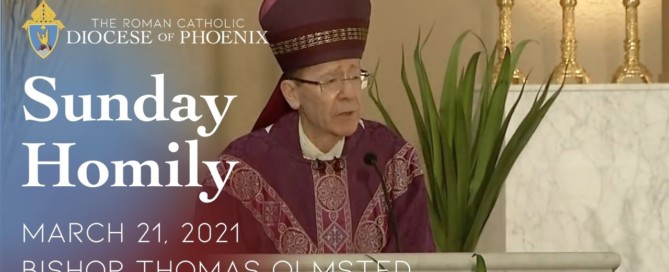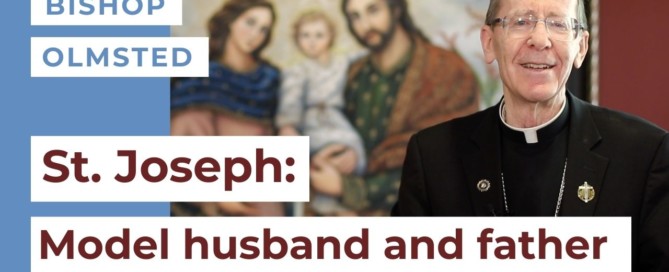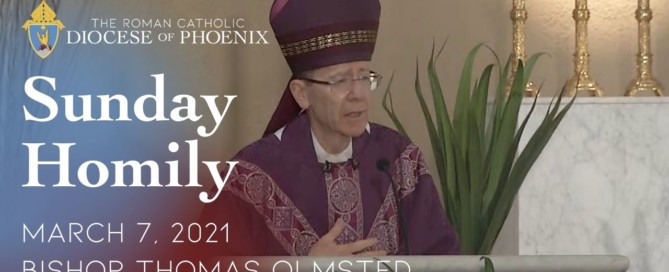Welcome to Our New Website!
Not in the flesh but the Spirit
Following is the prepared text from Bishop Olmsted’s homily for the 5th Sunday of Lent.
Not in the flesh but the Spirit
March 21, 2021
“…you are not in the flesh; on the contrary you are in the Spirit, if only the Spirit of God dwells in you” (Rom 8:9).
These words of St. Paul tie together all the Sacred Readings today. They describe how Jesus transforms our lives completely when we surrender to Him through faith. They tell us who disciples of Christ become: we are no longer “in the flesh” no longer alienated from God, no longer distant from Him. Quite the opposite, every day and every place, God draws near to us as a loving Father. At the moment of Baptism, when we renounce Satan, profess our faith in God and are washed clean of our sins, we are rescued from the powers of darkness, freed from bondage to “the world, the flesh and the devil,” filled with the Holy Spirit and made beloved children of God. All our Sacred Readings today speak of this wondrous blessing.
In our First Reading, Ezekiel (Cf. Ezek 37:12f) prophesied the impact that would happen at Baptism: “O my people, I will open your graves and have you rise from them…Then you will know that I am the Lord, when I open your graves and have you rise from them, O my people! I will put my Spirit in you that you may live.” This prophecy of Ezekiel was fulfilled when Jesus raised Lazarus from the tomb. After being buried for four days, Lazarus was restored to life when Jesus cried out in a loud voice, “Lazarus, come out!” At once, the dead man came out, still tied hand and foot with burial bands. Then, Jesus said, “Untie him and let him go.”
Let us savor these words in our hearts. For they tell us of the freedom that Jesus gives at Baptism and make clear what He wishes to say and do for everyone who gets tangled up by addictions and bound like a slave in sin. How great is the desire of Jesus to free us from the bonds of sin and restore us to new life in Him.
When the merciful love of Jesus, conquering the powers of darkness, freed Lazarus from the bonds of death and restored him to life, many who witnessed this miracle began to believe in Jesus as Lord and decided to follow the example of Jesus’ friends. They also wanted to experience the fulfillment of Christ’s words, “Did I not tell you that if you believe you will see the glory of God?” The miraculous new life that Lazarus experienced is what Jesus will bestow on our catechumens in two weeks as they are baptized at the Easter Vigil. The Lord, in the words prophesied by Ezekiel, will say to them (37:13), “O my people! I will put my Spirit in you that you may live;” and (Ezek 36:26), “A new heart I will give you.” Never let us forget this promise. God promises to replace hearts of stone with hearts made new in the Holy Spirit.
But how does the Holy Spirit work in our hearts? Not by force but by attraction. He does not drive us by threats but draws us by love. He invites us to surrender in filial trust to God and allow His Spirit to make us new within, for wherever God is present, there is kindness and mercy. The depth of God’s love that draws us, His mercy that attracts us like a magnet, is revealed in the tears of Jesus at Lazarus’ tomb: “Jesus wept.” Jn 11:35 Seeing His tears, the people said, “See how He loved him.” His tears reveal something far greater than words can express; they point forward to the moment when Jesus redeemed the world on the Cross and cried out “It is finished!” “Consumatum est.” At that moment, a sword pierced His heart, and immediately blood and water flowed forth, symbols of the new life we receive in the Sacraments, especially Baptism and the Eucharist.
Jesus did far more than restore the earthly life of Lazarus; He revealed a truth that His forthcoming death and Resurrection would bring into our world: the triumph of His mercy over sin and death. He pointed forward to the day that St. Paul would write: “O death, where is your victory? O death, where is your sting?”
The Letter to the Hebrew (5:7) tells us that Jesus’ tears were part and parcel of His prayer as the great High Priest of the New Covenant: “In the days when He was in the flesh, Jesus offered prayers and supplications with loud cries and tears…and He was heard because of His reverence. Son those He was, He learned obedience from what He suffered, and when He was made perfect, He became the source of eternal salvation for all who obey Him, declared by God high priest according to the order of Melchizedek.”
Through His obedience, Jesus reversed the disobedience of Adam and Eve. Just as sin caused suffering and death to enter history, Jesus’ obedience restored life (Lk 22:42), “Father, if you are willing, take this cup away from me; still, not my will but yours be done.”
By becoming one with us in the flesh, Jesus entered every dimension of human life, including suffering and death, in order to conquer them from within and transform them into sacrificial love. The tears of Jesus confirm the truth of what He taught in the Beatitudes, “Blessed are they who mourn, for they will be comforted.” Mt 5:3
In His friendship with Lazarus, we see the love of Christ as both God and man. “For as true man, He wept for Lazarus His friend and as eternal God raised Him from the tomb.”
This is who Jesus was for Lazarus and his sisters Martha and Mary, and who He is today for you and me. As St. Paul wrote to the Romans (vs 8:9), “…you are not in the flesh; on the contrary you are in the Spirit, if only the Spirit of God dwells in you.” Rom 8:9 At every Eucharistic sacrifice, we have the privilege of hearing Him say to us what He said to the Twelve at the Last Supper (John 15:9ff), “As the Father loves me, so I also love you. Remain in my love…”
St. Joseph: Model husband and father
St. Joseph: Model husband and father
On March 19 we celebrate the first of two feast days in the Church’s calendar that honor St. Joseph, recognizing him as the Guardian of our Redeemer and Patron of the Catholic Church. In December 2020, Pope Francis declared that a whole year be dedicated to St. Joseph, and he invited us to contemplate the life of this great saint by turning to him in prayer and reflecting on his good example as husband and father to the Holy Family.
Solemnity of St. Joseph
As we celebrate the Solemnity of St. Joseph this Friday, March 19, 2021, be advised that the faithful are permitted to eat meat. Per Canon 1251, solemnities supersede Friday abstinence with the exception of Good Friday. Enjoy!
Abstinence from meat, or from some other food as determined by the Episcopal Conference, is to be observed on all Fridays, unless a solemnity should fall on a Friday. Abstinence and fasting are to be observed on Ash Wednesday and Good Friday.
Through Christ we are able to see
Following is the prepared text from Bishop Olmsted’s homily for the 4th Sunday of Lent.
Through Christ we are able to see
March 14, 2021
“You were once darkness, but now you are light in the Lord.” – Eph 5:8
When St. Paul first brought the light of Christ to Ephesus, it was a city living in dark rebellion against God, rife with immorality, impurity and greed. Nonetheless, many Ephesians opened their hearts to Paul’s preaching, believed in Jesus and were baptized. Then, a few years after the seed of faith was planted in Ephesus, St. Paul wrote a letter to the Christians there, telling them, as we heard in our Second Reading of this Mass, “You were once darkness, but now you are light in the Lord.” The Ephesians, before Paul brought the Gospel to them, were like the man born blind, whom Jesus healed. It was not because of sin that he had been born blind, but “so that the works of God might be made visible through him” (Jn 9:3).
Many of our contemporaries in America today are like the Ephesians, blind to the snares of the kingdom of darkness, enslaved by addictions and immorality. Among these are Christians who have slipped backwards into the bondage of sin. So, St. Paul’s words are right on the mark, still today, for those entrapped in the wrong-doing from which Jesus freed them in Baptism. With humility and gentleness, the Lord does not shame them, but He does warn them not to be collaborators with those who live in rebellion against God, and to “take no part in the fruitless works of darkness” (Eph 5:11). He invites them instead to turn again in contrite faith to the Light of the Lord As Jesus says, “…light produces every kind of goodness and righteousness and truth (Eph 5:9). Therefore, “Awake, O sleeper, and arise from the dead, and Christ will give you light” (Eph 5:14).
Today’s Gospel tells of two different ways to respond to the light of Christ:
- on the one hand, a blind man begins in physical blindness but ends up with both physical and spiritual vision through his encounter with Christ and belief in Him.
- on the other hand, some of the Pharisees begin with the ability to see physically but end up being spiritually blind to the revelation of God in Jesus.
Many people heard about the miracle that Jesus performed, but only the blind man defended Jesus in the confrontation with the unbelieving group of Pharisees. Even the parents of the formerly blind man, out of fear, put their son in jeopardy by refusing to stand in solidarity with him. Fidelity to Christ can entail risk and ridicule; nonetheless the formerly blind man stood his ground. Long before coming to full faith in Jesus, he boldly defended the truth about the miracle, saying, “If this man were not from God, He would not be able to do anything.”
Are there miracles happening in our day that you and I do not have the boldness to acknowledge? Think of the miracle of bread and wine at Mass transformed into the Body and Blood of Christ. When we defend the truth, as the former blind man did, then the Lord leads us to deeper faith. In order to do that for the formerly blind man, Jesus sought him out a second time and spoke with him about faith, asking him, “Do you believe in the Son of Man?” “Who is He, sir,” he replied, “that I may believe in Him?” Jesus said, “You have seen Him and the One speaking with you is He.” Recall that, until this moment, the formerly blind man had not seen Jesus with his own eyes. The first time they met, Jesus had smeared his blind eyes with mud made from saliva and then sent him off saying, “Go wash in the Pool of Siloam.” Not until this moment did he actually see Jesus, face to face. Only at this moment, too, did Jesus reveal to him that He is the Son of Man. At once, then, the man said, “I do believe, Lord, and he worshipped Him.” Living faith in Jesus comes at a great price, but it is a treasure beyond compare, worth all it may cost. We learn from this miraculous cure, not only about the journey to faith, but also about the grave danger of cynical disbelief, a major roadblock to faith and worship.
Right after the healed man worshiped Jesus, the Lord said to the crowd, “I came into this world for judgment, so that those who do not see might see, and those who do see might become blind.” Our eternal destiny is placed in terrible danger if we descend into skepticism, or let cynicism sour our soul. We must safeguard our heart from the pride that refuses to see God’s mercy, even though it abounds throughout His creation.
For good reason, the first of the Ten Commandments is this: “You shall worship the Lord your God and Him only shall you serve.” Obedience of faith is our first obligation as His creatures. “Our duty toward God is to believe in Him and to bear witness to Him” (CCC 2087). The truth and goodness of our Savior help us to see how deformed and destructive cultures become when not open to the presence and mercy of Christ. To be able to see evil and to name it accurately frees us to become witnesses of Christ. New depths of gratitude for Christ’s Redemption lead to livelier faith expressed in adoration and worship.
There is a poem by Jessica Powers that might come close to capturing the formerly blind man’s gratitude for the gift of faith:
God fills my being to the brim
with floods of his immensity.
I drown within a drop of Him
whose sea-bed is infinity.
It is not surprising that this formerly blind man has been, from earliest times, a symbol of that journey of faith that leads to fullness of life in Christ. Baptism begins a long journey. With the grace and light of Christ, we grow to full spiritual maturity. His Holy Spirit teaches us how to engage popular cultures with the light of truth and with the balm of mercy. The light of Christ unmasks the lies and deceptions of a culture of death while building a culture of life. We learn the wisdom of following the mandate of the Letter to the Hebrews 12:2: “Keep your eyes fixed on Jesus, who inspires and perfects our faith.”
As new J&J vaccine arrives in Arizona, health leaders say take any vaccine that’s available
As new J&J vaccine arrives in Arizona, health leaders say take any vaccine that’s available
Alison Steinbach and Stephanie Innes, Arizona Republic
Doses of the new, one-shot Johnson & Johnson COVID-19 vaccine are arriving in Arizona, leaving many Arizonans asking if they should get it or one of the two-shot Pfizer and Moderna vaccines.
The answer, health officials say, is get whichever is available to you when you become eligible, because they all protect against severe outcomes.
Some people are sure to still have preferences based on convenience, health or even religious reasons, because the three available vaccines are slightly different.
But the good news is researchers say all three are effective vaccines that prevent hospitalizations and deaths from COVID-19.
Read more from AZ Central featuring an interview with Dcn. Billy Chavira.
Piper Trust $10M grant fuels new partnership with Creighton, St. Vincent de Paul to improve health care for Maricopa County’s most needy
Piper Trust $10M grant fuels new partnership with Creighton, St. Vincent de Paul to improve health care for Maricopa County’s most needy
Reducing the number of uninsured patients who rely on hospital emergency rooms is at the heart of a new partnership between three Catholic-based entities, a collaboration whose leaders say will improve care for underserved populations by transforming the system that directs those patients to more appropriate services.
Officials of the Virginia G. Piper Charitable Trust, the Society of St. Vincent de Paul in Phoenix and Creighton University announced the collaboration during a virtual joint news conference Thursday, March 4.
Fueled by a $10 million gift from the Piper Trust, the partnership will more deeply integrate St. Vincent de Paul’s Virginia G. Piper Medical Clinic into the Creighton Health Sciences Phoenix Campus curriculum.
God’s love poured into hearts
Following is the prepared text from Bishop Olmsted’s homily for the 3rd Sunday of Lent.
God’s love poured into hearts
March 7, 2021
“The love of God has been poured out into our hearts through the Holy Spirit.” – Romans 5:2
The Samaritan woman at Jacob’s was certain this was impossible for her. “Not gonna’ happen to me,” she must have been thinking. After all, she had been divorced five times. Imagine the pain of one broken marriage; multiply that five times over and we have an idea of why the Samaritan woman came to get water at noon, when no one else was at Jacob’s well. She had decided that isolation and loneliness were better than a group of women staring at her in scorn.
However, one day, when she arrived at the well, Jesus was there, and, contrary to custom, He spoke to her, even asked her for a drink of water — this was not supposed to happen.
What she did not know was that Jesus came into our world for sinners, not the self-righteous. He came to demolish the kingdom of Satan and to usher in the Kingdom of God. He came to break down walls of separation caused by sin and shame that prevented people from receiving God’s love.
Through His Baptism by John in the waters of the Jordan, Jesus took upon Himself the burden of iniquity, that built walls and caused division. And He pledged to conquer it by His suffering and death on the Cross and His glorious Resurrection. Already at His Baptism in the Jordan, the Holy Spirit overshadowed Jesus and the voice of God the Father was heard to say, “You are my Beloved Son.” The wall of iniquity was being destroyed, and that victory of mercy would reach its climax through Jesus’ total gift of self on the Cross.
The American poet Robert Frost wrote, “Something there is that doesn’t love a wall, that wants it down.” That’s true; and yet, an even deeper truth is this: “Some One there is who doesn’t love a wall, who wants it down.” The One who doesn’t love a wall is Jesus. St. Paul wrote in his Letter to the Ephesians (2:13), “Now in Christ Jesus you who once were far off have become near by the blood of Christ. For He is our peace, He who made both one and broke down the dividing wall of enmity…”
Jesus repaired the terrible division caused by sin, reconciled the human family with God, and removed whatever walls keep us from loving one another. But many did not recognize Jesus as our Savior and walked on the edge of despair. Therefore, it is easy to imagine the Samaritan woman, before she met Jesus, pouring her heart out to God in prayer with the words of Psalm 44 (vs 16), “All day long my disgrace is before me: my face is covered with shame.” And then, after opening her heart to Jesus at the well, imagine her saying with Psalm 118, “Give thanks to the Lord for He is good, for His love endures forever.”
When the Samaritan woman told Jesus, “How can you, a Jew, ask me, a Samaritan woman, for a drink?” He answered, “If you knew the gift of God and who is saying to you, ‘Give me a drink,’ you would have asked Him and He would have given you living water.” Since the woman still did not understand, or perhaps was afraid to understand, Jesus went on to say. “Everyone who drinks this water will be thirsty again. But whoever drinks the water I shall give will never thirst; the water I shall give will become a spring of water, welling up to eternal life.” Since the woman was afraid to talk of something that really needed to be addressed, Jesus moved the topic in that direction, saying, “Go, call your husband and come back.”
To her credit, the woman admitted in all honesty, “I do not have a husband,” thereby allowing the conversation to switch from water to human relationships, from physical thirst to the thirst of a heart wounded by sin. Now, a conversation of depth was able to happen.
Jesus, gently yet candidly told her, “You are right in saying, ‘I do not have a husband.’ For you have had five husbands, and the one you have now is not your husband.”
A wondrous thing occurred at that point. Even though Jesus made clear that He knew all about her shameful past, the truth of His words did not embarrass her. On the contrary, the truth, spoken in love, set her free. It gave her a new sense of self, lifted her out of her misery and opened her eyes to see Jesus, not only as a man but also as the Messiah, and to see herself, not as an object to be used and cast aside but as a beloved daughter of God, as one whose dignity was restored.
When she first arrived at the well, her shame made her try to hide all the painful things of her past. After a conversation with Jesus, she rejoiced that He knew everything about her. This is what happens when we open our hearts to Jesus in trust and confess our sins to Him.
And that brings us to another amazing fact: as a result of this one conversation, this Samaritan woman became an incredibly successful messenger of Jesus’ love!” She returned to her hometown with a new awareness of being known and loved by God. No longer isolated or ashamed, she told all her neighbors about Jesus. One statement of hers in particular got their attention: “He told me everything I have done.” She rejoiced that Jesus knew her failure and wounds, because she discovered that whoever opens her heart to Jesus receives the waters of His mercy. Jesus knows He also loves.
Many of the townsfolk, then, seeing that there was something new and wonderfully different about this woman, went to see Jesus for themselves and also put their faith in Him.
What do you and I learn from the woman at the well? At least four things:
First, that God knows everything about us and loves us still. Even if our lives have become a tangled mess, He loves us still. As St. Paul writes to the Romans (5:8), “God proves His love for us in that while we were still sinners Christ died for us.” This is the wondrous mercy we celebrate every time we go to confession and whenever we celebrate the Eucharist.
Second, the Lord constantly seeks us out, when we least expect Him, when we are fearful or ashamed, and even when we try to hide. He draws near with His mercy, in order to set us free. As Jesus says: “Here I stand, knocking at the door. If anyone hears me calling and opens the door, I will enter his house and have supper with him, and he with me.” Rev. 3:20
Third, God gives us far more than we can ask for or imagine. The woman at the well said to Jesus: “Give me this water, sir,” thinking of ordinary water; what Jesus gave her instead was far greater:
- the water of forgiveness,
- the water of mercy and truth,
- the water of the Holy Spirit to bring her new life in Christ and restore her dignity.
God always gives us far more than we can ask or imagine.
Fourth, Jesus calls sinners like us not only to be His disciples but also to be His witnesses to the merciful love of God.
If the Lord could use a 5-time divorcee to bring His message of hope to her neighbors in Samaria, He could use you and me. That is what He desires to do. That is why St. Augustine said, the woman of Samaria represents the Church. What Jesus did in and through her, He longs to do in you and me. He longs to heal our pain and forgive our sins and thereby make us messengers of His mercy and witnesses of hope.







